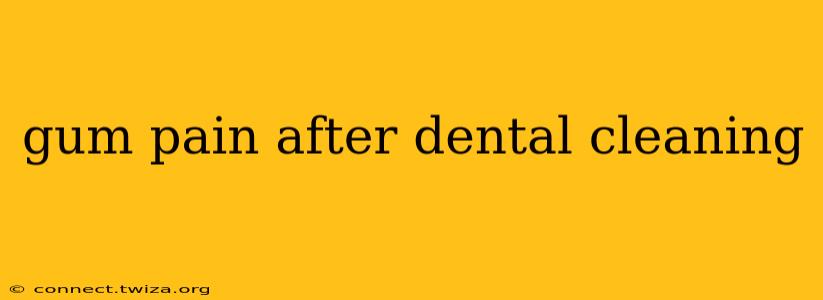Experiencing gum pain after a dental cleaning is more common than you might think. While a professional cleaning is crucial for maintaining good oral health, it can sometimes leave your gums feeling sore, tender, or even inflamed. Understanding the causes of this post-cleaning discomfort is the first step towards effective management and prevention. This comprehensive guide will explore the reasons behind post-cleaning gum pain, offer remedies for relief, and advise you on when professional attention is necessary.
What Causes Gum Pain After a Dental Cleaning?
Several factors contribute to gum pain following a dental cleaning. The most common culprits include:
- Inflammation: The cleaning process, while beneficial, can irritate already inflamed gums. If you have gingivitis (gum disease), the cleaning might temporarily exacerbate the inflammation, leading to increased sensitivity and pain.
- Deep Cleaning: A deep cleaning, or scaling and root planing, is more invasive than a regular cleaning. It involves removing plaque and tartar from below the gum line, which can cause temporary soreness and discomfort.
- Aggressive Cleaning: While rare, overly aggressive cleaning techniques by a dental hygienist can contribute to gum irritation and pain.
- Underlying Gum Disease: Pre-existing gum disease, such as periodontitis, can make gums more susceptible to pain and bleeding after a cleaning. The cleaning itself might reveal the extent of the underlying problem.
- Sensitivity to the Cleaning Tools: Some individuals might have an allergic reaction or sensitivity to the tools or cleaning solutions used during the procedure.
How Long Does Gum Pain After a Dental Cleaning Last?
The duration of gum pain varies depending on the individual and the type of cleaning performed. Mild discomfort typically subsides within 24-48 hours. However, if the pain persists for longer than a few days or intensifies, it's crucial to consult your dentist.
Home Remedies for Gum Pain After Cleaning
Several home remedies can provide temporary relief from post-cleaning gum pain:
- Saltwater Rinse: Rinsing your mouth with warm salt water (1/2 teaspoon salt dissolved in 8 ounces of warm water) several times a day helps reduce inflammation and cleanse the area.
- Cold Compress: Applying a cold compress to your cheek can help numb the area and reduce swelling.
- Over-the-Counter Pain Relievers: Ibuprofen or acetaminophen can help manage pain and inflammation. Always follow the recommended dosage instructions.
- Gentle Brushing and Flossing: Continue your regular oral hygiene routine, but be extra gentle when brushing and flossing around the affected areas.
When Should I See a Dentist After a Dental Cleaning?
While some discomfort is expected, you should contact your dentist if:
- The pain is severe or persistent (lasting more than a few days).
- You experience excessive bleeding.
- You notice swelling or pus formation.
- You have difficulty opening your mouth.
- You develop a fever.
These symptoms could indicate a more serious issue requiring professional attention.
Can Gum Pain After a Dental Cleaning Indicate Gum Disease?
Yes, persistent or severe gum pain after a dental cleaning can be an indicator of underlying gum disease. The cleaning might have exposed or exacerbated pre-existing conditions. Your dentist will be able to diagnose and treat any underlying issues.
How Can I Prevent Gum Pain After My Next Cleaning?
Proactive measures can help minimize the risk of post-cleaning discomfort:
- Maintain excellent oral hygiene: Regular brushing, flossing, and using mouthwash help prevent plaque buildup and gum inflammation.
- Schedule regular dental checkups: Preventative care helps catch and address any problems early, minimizing the need for more intensive cleanings.
- Communicate with your dentist: Let your dentist know about any existing gum sensitivity or concerns before the cleaning.
By understanding the causes of gum pain after a dental cleaning and following these tips, you can better manage any discomfort and maintain optimal oral health. Remember, seeking professional dental advice is always the best course of action if you have concerns.
